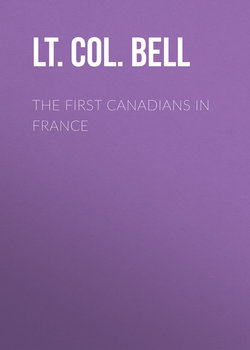Читать книгу The First Canadians in France - Lt. Col. Frederick McKelvey Bell - Страница 7
CHAPTER VI
ОглавлениеWhen we awoke the sun was high in the heavens, and through the train windows we could see the steep banks of the Seine as we wound along that picturesque river toward Rouen. From time to time we passed small villages, the red tile of their roofs contrasting prettily with the snow-white of the walls. Some houses were decorated with bright blue or green, and as they swept by the window in kaleidoscopic array, the scene was one of manifold variety.
The French love a dash of colour; it is manifest everywhere – in their clothes, their houses and their military uniforms. In the larger cities where civilisation is over-developed, and humanity is more effete, the bright colours have given place to pale and delicate shades – an indication of that transformation of life which we call art. But in these little country villages, a thousand years or more behind the times, Dame Nature still holds sway, and the primary colours riot in their rugged strength. Centuries from now these rural hamlets, grown to greater size, losing their primitive audacity, will fade as well; and looking back will marvel at the boldness of their youth.
Every quarter-mile along the track a lone sentinel, in sky-blue coat and scarlet cap, guarded our path. With fixed baionette he stood hour by hour, watchful and keen. He had a little thatched sentry-box into which he might retire when it rained, and through the small round windows watch on either side.
As we pulled into the railway station at Rouen, we could see resourceful "Tommy" cooking his breakfast on a little charcoal stove. "Tommy" is always at home, no matter where we find him – whether it be on the battlefields of France or Belgium, or on the rock-bound shores of Gallipoli.
Our men descended from their coaches, lugged out their bags of bread, their cheese and jam and "bully-beef." The sergeant-cook meted out each share, and they soon were at their morning meal.
A few hours later Reggy and I were seated at luncheon in the Hotel de la Poste. The salle a manger was filled with English, French and Belgian officers, and their wives or friends, and to the casual observer the place was as gay as in times of peace. But in spite of the bright colours of the uniforms, in spite of the "chic" Parisian hats and pretty faces of the ladies, one felt over all an atmosphere subdued and serious.
It is true wine sparkled upon almost every table, but in France this doesn't necessarily mean gaiety. Every Frenchman drinks wine, but it is very rare indeed to see one drunk. Wine, like water at home, is used as a beverage – not as an intoxicant.
Imbued with the spirit of the time and place, Reggy and I called for a bottle of old Chambertin, and under its mellowing influence, care and the war were soon forgotten.
Of course we visited the Cathedral, and listened to the old sexton pouring incomprehensible data into our stupid ears for half an hour while we examined the rare stained windows and the carved oak door. When we returned to the train, the senior major and the transport officer were deep in conversation: "But where are your papers?" the R.T.O. was asking.
"We haven't any," the major replied. "That French conductor wouldn't hold the train until they arrived. Can't we go on without them?"
